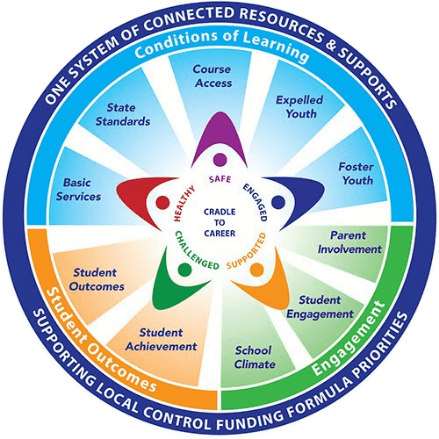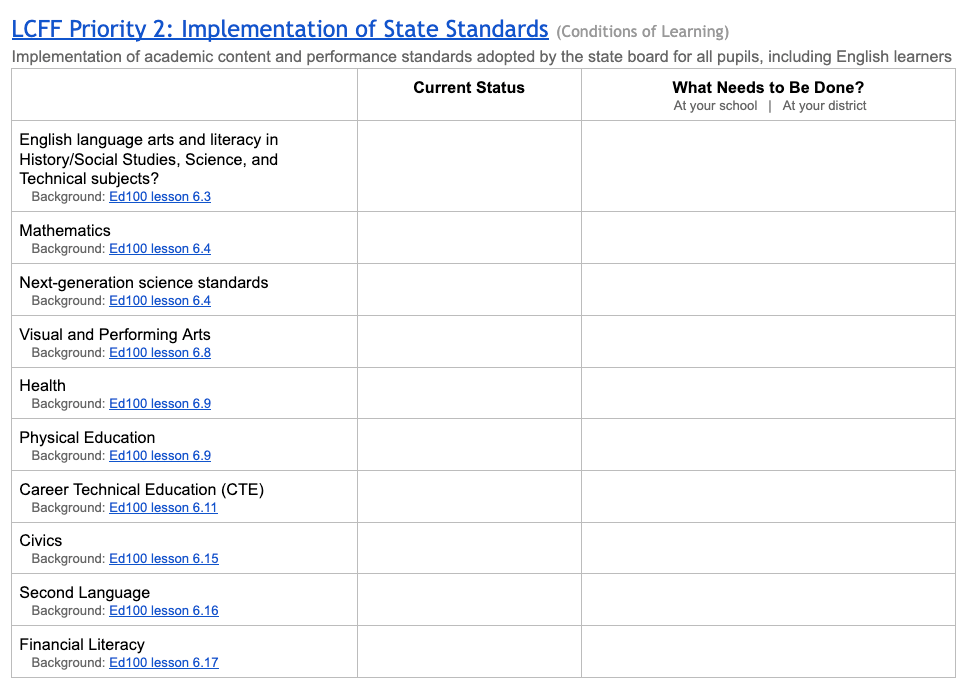What's an LCAP?

Your chance to tell the district what you think
Who holds the most power in the education system? It's complicated, of course, but practically speaking the best single answer is the school district.
Use the Ed100 / PTA LCAP Checklist to prepare
District administrators hire faculty and staff. They implement policies set by the school board, the state, the federal government, and health authorities. Districts manage money and property. Districts negotiate with unions. They respond when there is a crisis, interacting with local agencies, health officials and law enforcement. They manage public communication with families and the public.
They also plan.
The three-year plan
Every year, school districts in California are required to prepare a three-year public plan known as Local Control and Accountability Plan (LCAP, pronounced EL-cap). The LCAP officially defines the district's goals and priorities. Like the budget, the LCAP is an expression of values. Anything not included in the LCAP isn't a priority, so it's apt to be overlooked.
The LCAP must be reviewed and formally approved
As part of the budget process, the LCAP must be approved by both the district board of education and the county board of education through a process of public review and comment. Which all sounds great — but there's a problem.
In the service of precision, LCAPs are complicated. They often smack of legalese and edu-jargon. Because they are long and precise, they are marbled with acronyms and abbreviations. They don't look like something written for regular people to read and understand.
Some school districts hold events to explain their LCAP documents, but many don't — or they don't try too hard to get rookies in the room. This post helps explain the key elements of your district's LCAP, why they matter, and how to learn about them.
Together with the California State PTA, Ed100 has developed a checklist you can use to weigh your priorities. Are the things that matter to you included in your district's plan? By presenting your input in a way that harmonizes with the structure of the LCAP, you make it easier for the school district to hear you, so your priorities are more likely to turn into plans and actions. This checklist is meant to be used — so create your own copy of the template and make it yours!
What is an LCAP?
The LCAP (Local Control Accountability Plan) is a three-year plan, updated annually, that describes what the district plans to do to support student outcomes. It's a document with a required structure built around ten priority areas, as reflected in the diagram below. Your district's LCAP must include information about how it serves students with different backgrounds, particularly those living in poverty, foster youth, and students who are learning English.
Why is the LCAP required?
The LCAP is specifically a California thing. Other states don't use it.
California's main education finance law is known as the Local Control Funding Formula (LCFF). This policy allocates base funding to districts based on the number of students in attendance. Districts receive extra money per student to invest in the education of English language learners, foster youth and children living in poverty.
Districts have considerable flexibility about how to use the money they get. In exchange for this flexibility they are obligated to be transparent about how they spend the money, and on which students. The LCAP is the key instrument for districts to deliver this transparency. The State Board of Education provides districts with a template, organized into priority areas, that districts are expected to use or adapt. The LCFF-LCAP system, passed into law in 2014, was a major legislative achievement of the Brown Administration.
Holding school districts accountable
The most heroic assumption about the LCAP is that community members actually read the darn thing. Another brave leap is to believe that community members will use it to hold their schools accountable for results, and for using the extra money as intended.
Somebody in your school’s parent community needs to be the one to drive a conversation about the LCAP. It’s you, right? Be honest.
When the LCAP was originally created in 2014, we paired up with California State PTA to help parents get prepared for it. The result, the LCAP Parent Checklist, has been updated ever since to reflect changes. The checklist describes each section of the LCAP and explains background information you need to provide informed and thoughtful input. The checklist links directly to Ed100 lessons on all the state priorities. Here is a peek at what it looks like before you start filling it in:
Community Engagement
The LCAP process is an opportunity to let the district know what is important to you and your school. Preparing the LCAP requires school districts to consult with the District Parent Advisory Committee (PAC) and English Learner Parent Advisory Committees (DLAC) as well as parents, students, school personnel, local bargaining units, and the community. School Site councils and site based student and parent groups (PTSAs) need to understand how their work fits with the district's LCAP, too. Districts will put together a schedule (example) that includes when they will consult with the school community.
|
Questions to Ask at LCAP Community Meetings |
|---|
|
What are the district's top priorities? |
|
How much progress was made last year toward meeting those goals? |
|
What are the greatest needs? |
|
Where are the gaps in student performance? Are they getting better or worse, and why? |
|
How is the district delivering services for low-income students, English learners and foster youth? (Under LCFF, your district receives specific funding that should used in direct support of these students — it is the community's job to notice if this isn't happening.) |
|
Did the district use all of the money in its plan last year or are there some areas where money was not spent? |
|
If the plan is not working, what changes are being considered? |
When must the district's LCAP be completed?
Your district is required to adopt its LCAP as part of its annual budget process, which must be done by the end of June.
Who actually writes the LCAP document?
The LCAP is officially completed by school district staff. Sometimes school districts get help from consultants, or from the staff of their county office of education.
Who is responsible for approving the LCAP?
Your district's LCAP will be complete when your school board votes to adopt it. If you think something is wrong with your district's plan, this will be your last opportunity for influence each year.
After your district board signs off on the plan, your county office of education is then responsible for reviewing it and either approving it or suggesting revisions. County offices in turn have their own LCAPs reviewed by the California Department of Education. Everything moves pretty fast at the end, which is why you want to get your input in early!
Do schools produce an LCAP?
Not unless they are charter schools. The LCAP is required for districts, charter schools, and county offices of education. (Technically, all of these entities are Local Education Agencies.) Charter schools must prepare an LCAP because they operate separately from a school district. Ordinary public schools don’t have to file an LCAP. However, the LCAP development process is meant to inspire useful conversation and reflection at the school level, too.
Where can I find examples of LCAP documents?
Frankly, your best bet is to search on Google.
Districts are required to post their LCAP documents online… somewhere… but not required to post them anywhere in particular. An official collection site for LCAP data exists, posted by the State Department of Education. It is largely unused, which underscores the reality: these are local accountability reports. There is no mandate to collect them, compare them, or learn from them. No one "upstairs" is collecting, comparing, and analyzing this stuff.
What's the next step?
OK, now that you have the background, time to get to work. Somebody in your school's parent community needs to be the one to drive a conversation about the LCAP. It's you, right? Be honest.
Not to worry - you don't have to do it alone. Use the LCAP Checklist template to collect the information you need and work collaboratively with other parent leaders. The whole thing is set up in Google Docs, so it's easy to share. If you need help, ask a student. They use and share Google Docs all the time.
One last item, just for fun...
When LCFF and the LCAP were first developed, Jeff felt inspired to write a song about it. It's a little dated now, but still good edugeeky fun. Read the lyrics.
Last updated February 2024.
Tags on this post
Accountability LCAP Local control PTA TemplateAll Tags
A-G requirements Absences Accountability Accreditation Achievement gap Administrators After school Algebra API Arts Assessment At-risk students Attendance Beacon links Bilingual education Bonds Brain Brown Act Budgets Bullying Burbank Business Career Carol Dweck Categorical funds Catholic schools Certification CHAMP Change Character Education Chart Charter schools Civics Class size CMOs Collective bargaining College Common core Community schools Contest Continuous Improvement Cost of education Counselors Creativity Crossword CSBA CTA Dashboard Data Dialogue District boundaries Districts Diversity Drawing DREAM Act Dyslexia EACH Early childhood Economic growth EdPrezi EdSource EdTech Education foundations Effort Election English learners Equity ESSA Ethnic studies Ethnic studies Evaluation rubric Expanded Learning Facilities Fake News Federal Federal policy Funding Gifted Graduation rates Grit Health Help Wanted History Home schools Homeless students Homework Hours of opportunity Humanities Independence Day Indignation Infrastructure Initiatives International Jargon Khan Academy Kindergarten LCAP LCFF Leaderboard Leadership Learning Litigation Lobbyists Local control Local funding Local governance Lottery Magnet schools Map Math Media Mental Health Mindfulness Mindset Myth Myths NAEP National comparisons NCLB Nutrition Pandemic Parcel taxes Parent Engagement Parent Leader Guide Parents peanut butter Pedagogy Pensions personalized Philanthropy PISA Planning Policy Politics population Poverty Preschool Prezi Private schools Prize Project-based learning Prop 13 Prop 98 Property taxes PTA Purpose of education puzzle Quality Race Rating Schools Reading Recruiting teachers Reform Religious education Religious schools Research Retaining teachers Rigor School board School choice School Climate School Closures Science Serrano vs Priest Sex Ed Site Map Sleep Social-emotional learning Song Special ed Spending SPSA Standards Strike STRS Student motivation Student voice Success Suicide Summer Superintendent Suspensions Talent Taxes Teacher pay Teacher shortage Teachers Technology Technology in education Template Test scores Tests Time in school Time on task Trump Undocumented Unions Universal education Vaccination Values Vaping Video Volunteering Volunteers Vote Vouchers Winners Year in ReviewSharing is caring!
Password Reset
Search all lesson and blog content here.
Login with Email
We will send your Login Link to your email
address. Click on the link and you will be
logged into Ed100. No more passwords to
remember!
















Questions & Comments
To comment or reply, please sign in .
Marina Ramos1 July 9, 2020 at 1:44 am
Thank you.
Kelley Mccarty October 20, 2019 at 2:38 am
Iris December 1, 2017 at 7:21 pm
Iris November 11, 2017 at 8:44 pm
vpeterson_2001 April 28, 2015 at 8:13 pm